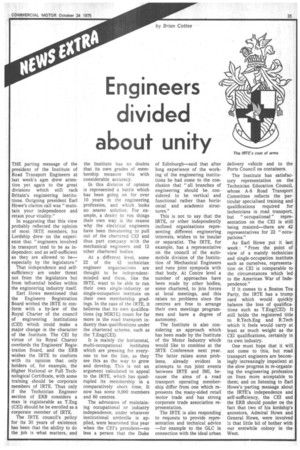Engineers divided about unity
Page 27

If you've noticed an error in this article please click here to report it so we can fix it.
THE parting message of the president of the Institute of Road Transport Engineers at last week's agm drew attention yet again to the great divisions which still rack Britain's engineering institutions. Outgoing president Earl Howe's clarion call was "maintain your independence and retain your vitality."
In suggesting that this view probably reflected the opinion of most IRTE members, his Lordship drew •on the experience that "engineers involved in transport tend to be as independent and as self-sufficient as they are allowed to be— especially by the legislators."
That independence and selfsufficiency are under threat not from the legislators but from influential bodies within the engineering industry itself.
Earl Howe mentioned that the Engineers Registration Board wished the IRTE to conform with a by-law of the Royal Charter of the council of engineering .institutions (CEI) which could make a major change in the character of the Institute. The CEI by virtue of its Royal Charter overlords the Engineers' Registration Board, and the ERB wishes the IRTE to conform with its opinion that only holders of, for example, the Higher National or Full Tech. nological Certificate, with some training should be corporate members of IRTE. Thus only if the Technician Engineer section of ERB considers a man is registerable as T.Eng (CEI) should he be enrolled as a corporate member of IRTE.
The IRTE council's policy for its 30 years of existence has been that the ability to do the job is what matters, and the Institute has no doubts that its own grades of membership measure this with considerable accuracy.
In this division of opinion is represented a battle which has been going on for over 10 years in the engineering profession, and which looks no nearer solution. For example, a desire to run things their own way is the reason why the electrical engineers have been threatening to pull out of the chartered CEI and thus part company with the mechanical engineers and 12 other chartered bodies.
At a different level, some 22 of the 42 technician engineer organisations are thought to be independentminded and these, like the IRTE, want to he able to run their own single industry or single-occupation institute on their own membership gradings. In the case of the IRTE, it believes that its own qualifications (eg MIRTE) count for far more in the road transport industry than qualifications under the chartered scheme, such as the T.Eng(CEI).
It is mainly the horizontal, multi-occupational institutes which are pressing for everyone to toe the line, as they see this as the way to grow and develop. This is not an argument calculated to appeal to the IRTE, which has quadrupled its membership in a comparatively short time. It now has some 9,000 members and 60 centres.
The advocates of maintaining occupational or industry independence, under whatever institutional umbrella is applied, were heartened this year when the CEI's president—no less a person that the Duke of Edinburgh—said that after long experience of the working of the engineering institutions he had come to the conclusion that "all branches of engineering should be , considered to be vertical and functional rather than horizontal and academic structures."
This is not to say that the IRTE, or other independently inclined organisations representing different engineering interests, wishes to be insular or separatist. The IRTE, for example, has a representative on the council of the automobile division of the Institution of Mechanical Engineers and runs joint symposia with that body. At Centre level a number of approaches have been made by other bodies, some chartered, to join forces at local meetings, and this raises no problems since the centres are free to arrange their own meetings programmes and have a degree of autonomy.
The Institute is also considering an approach which has been made by the Institute of the Motor Industry which would like to combine at the IRTE Conference next year. The latter raises some problems, already evident in attempts to run joint events between IRTE and IMI, because the aims of a road transport operating membership differ from one which represents the many-sided retail motor trade and has strong corporate trade association representation.
The IRTE is also responding to requests to provide representation and technical advice —for example to the GLC in connection with the ideal urban delivery vehicle and to the Ports Council on containers.
The Institute has satisfactory representation on the Technician Education Council, whose A-8 Road Transport Committee reflects the particular specialised training and qualifications required for technicians in road transport, but " occupational " representation on the CEI is still being resisted—there are 42 representatives for 22 "occupations."
As Earl Howe put it last week : "From the point of view of a mainly technician and single-occupation institute such as ourselves, representation on CEI is comparable to the circumstances which led to the American War of Independence."
If it comes to a Boston Tea Party, the IRTE has a trump card which would quickly balance the loss of qualifications such as T.Eng(CEI). It still holds the registered title to R.Tech.Eng and R.Tech which it feels would carry at least as much weight ;as the CEI qualifications, certainly in its own industry.
One must hope that it will, not come to this, but road transport engineers are becomingly increasingly impatient at the slow progress in re-organising the engineering profession on lines more acceptable to them; and on listening to Earl Howe's ,parting message about the IRTE's independence and self-sufficiency, the CEI and the ERB should ponder on the fact that two of his lordship's ancestors, Admiral Howe and General Howe, were involved in that little bit of bother with our erstwhile colony in the West.








































































































